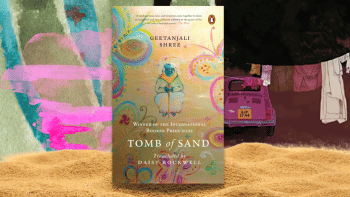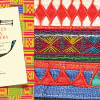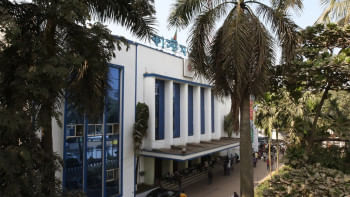'IN SENSORIUM' BY TANAÏS: The scent of the motherland

Discovering TanaÏs was an occasion of queer joy—here they are, an openly nonbinary author making Bangladesh proud. When I had finally received the book in the mail, In Sensorium: Notes for My People (Harper, 2022) was already the talk of many towns. The Kirkus Prize win has firmly established them as a force to be reckoned with. TanaÏs, a self-taught perfumer and author, now holds a literary award that has graced authors such as Ta-Nehisi Coates and Rebecca Solnit in previous years.
I knew that I had to get both the memoir and the accompanying perfume, 'Pilgrimage', for a fully immersive experience of In Sensorium. The perfume is an instant compliment-getter; the familiar spicy notes from one's mother's whole spices jar hits the senses first, then a host of attar-like earthy florals ease one into some rather unfamiliar scents. The base notes may surprise you—mitti attar, pyre ash, saltwater accord, among others. Like the perfume, the book too is divided into Base, Heart, and Head "Notes"; they are both written as well as olfactory notes for those the author calls "my people"—Bengali women and femme folk, or those who feel a sense of solidarity with the marginalised of the world.
"Ancient perfumes exist as fragments in texts, but what if we ourselves don't appear in texts? The dominant culture version of our histories become the Record of Power, where lies, misinterpretations, and erasures abound. I call these the patramyth—foundational lies and mythologies recorded in history to protect the powerful. There are multiple etymologies in the word patramyth, which shares the Greek root patria, or lineage, with patriarchy; patra is a written document in Sanskrit, a language wielded by the powerful in India for a couple of thousand years. Myth is an origin story, but in my mother tongue, Bengali, mithya is a lie."
TanaÏs inundates their memoir with wordplay as well as sound play, inventing their own defiant vocabulary that bends the rules of grammar and linguistics. The reader might have encountered in their grammar books that the pronoun 'tara' in cholito bhasha comes from its shadhu form 'tahara'. For some of us, years of formal schooling has cemented this etymology in our heads, rendering us unable to find an alternate reality. Breaking these moulds, the author declares, "The word 'they' is tara, the word for star", encouraging one to take a pause and consider these homographs in a new light.
In Sensorium then, is an invitation to the scholar, the critic and the pedantic to question their hegemonic forms of thinking and knowing. In TanaÏs' words these are patramyths—a neologism for the hegemonic grand narrative that leaves out marginalised voices and perspectives.
Reading this memoir has brought me face to face with a familiar discomfort—the question of authenticity or inauthenticity in diasporic narratives. In Sensorium is well researched, no doubt, yet a lot will seem factually incorrect to the Bangladeshi in Bangladesh. From where does TanaÏs eke out the history of the Boat Girls (the author literally translates this as 'nouka meye', which seems out of place in the Sylhet region)? Was there really a conspiracy to write Bangla in the Arabic script in 1952? Did the Pakistani military atrocities reach the villages of Bengal as early as the night of 25th March, 1971?
When these doubts plague us, we must remember that only figures, numbers, and statistics are found in the archive. Memories are fluid, experiences have more dimensions than mere facts. My experience of reading In Sensorium was hence, an exercise in leaving personal biases and preconceived notions at the door. After all, the memoir looks at the 1947 Partition, the Language Movement and the Liberation War directly in the eye. It also challenges the Indian hegemony in the South Asian diasporas of the world, questioning the silence around Bangladesh and the genocide of 1971.
TanaÏs bravely challenges the erasure of Bengali Muslim identity from the patramyth of Indian hegemony both within South Asia and in the diaspora. The author's interaction with a woman from West Bengal is poignant, rife with the feelings of dismissal and being forced to yield to the dominant culture's ways. This experience of being marginalised as Muslim is valid in TanaÏs' position of a second generation Bangladeshi-American, yet the book often glosses over the predicament of non Muslim and non Bengali minorities in Bangladesh.
Such a narrative runs the risk of positioning itself on the slippery slope between victimhood and the celebration of one's differences. The book still does the important work of questioning the literary and cultural canon; it wonders out loud whether Rabindranath considered the Muslim side of the story on the eve of the Partition of Bengal. The Rebel Poet emerges victorious in the age-old Rabindra versus Nazrul debate, yet Nazrul is already canonical.
The memoir is deeply personal and yet heavily historical. TanaÏs does not shy away from highly sensual and sexualised personal history; an ex lover of presumably high caste Indian descent is addressed in many chapters. Family history too has a powerful hold on the memoir as the author's parents reminisce the turbulent days of the Liberation War. TanaÏs has their own memories of growing up brown, Muslim, and queer in a white majority American society.
While the brown girl's coming of age narrative is having its moment in popular literature and culture, In Sensorium enters the conversation with its unique and fragrant vignettes of personal and national history intersecting at many points.
Qazi Mustabeen Noor is a PhD student at Queen's University, Canada.

 For all latest news, follow The Daily Star's Google News channel.
For all latest news, follow The Daily Star's Google News channel. 












Comments